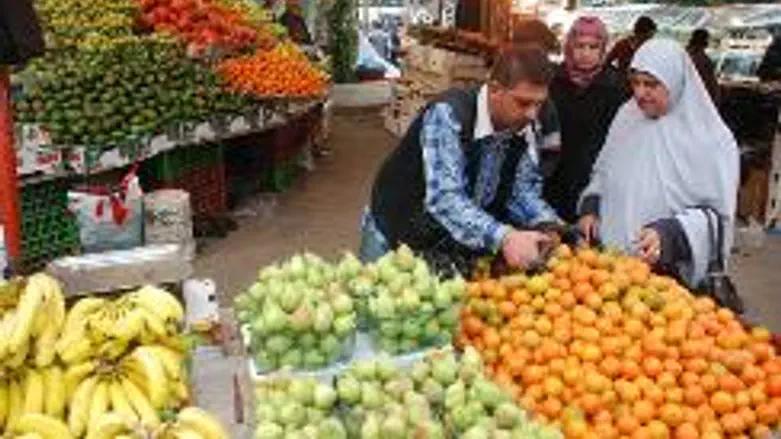
The Arabic-language PalToday website, based in Gaza, recently posted pictures showing a world of plenty for residents, despite more than two years of reports that the area is suffering from a humanitarian crisis. However, its English website for foreign audiences showed a picture of misery, focusing on a girl who wanted her terrorist father freed by Israel.
The pictures on the Arabic-language site were posted for the Eid al Adha Muslim festival, which recalls the forefather Abraham’s willingness to sacrifice his son, who the Bible states was Isaac. The Muslim tradition substitutes Ishmael, father of the Arab peoples, for Isaac.
 The pictures on the Arabic-language site are headlined with the caption, "Clothes for Their Children Despite the Siege,” referring to the partial blockade Israel placed on Gaza following the Hamas military coup more than two years ago.
The pictures on the Arabic-language site are headlined with the caption, "Clothes for Their Children Despite the Siege,” referring to the partial blockade Israel placed on Gaza following the Hamas military coup more than two years ago.
Israel has allowed thousands of trucks, bearing tens of thousands of tons of food, goods and equipment into Gaza, but the United Nations has claimed several times that a humanitarian crisis is “imminent.”
Statistics provided by the Palestinian Authority show that unemployment in the Gaza area dropped in the second quarter this year by 20 percent from 45.5 percent in the second quarter of 2008.
 Towards the Eid ad Adha holiday, Israel allowed approximately 7,000 head of cattle into Gaza as well as electricity, communications and water infrastructures, including bringing in equipment and repair teams to repair water and sewer facilities and to repair turbines and parts of the Gaza power station.
Towards the Eid ad Adha holiday, Israel allowed approximately 7,000 head of cattle into Gaza as well as electricity, communications and water infrastructures, including bringing in equipment and repair teams to repair water and sewer facilities and to repair turbines and parts of the Gaza power station.
Last August, Israel renewed the supply of gasoline for private use, according to the standard determined by the High Court as the threshold sufficient for humanitarian needs. The military coordinator for supervising shipments into Gaza (COGAT) noted, “While the minimum quotas determined by the High Court are only partially filled because of the debts owed by the gas stations in Gaza to the Palestinian Authority, a decision was made by the Coordinator during the summer to meet the threshold set by the High Court.
 “Cooking gas has been transferred to Gaza without restriction before, during and, of course, after Operation Cast Lead. It is important to note that the flow of diesel fuel to the power station continued to take place during and after Operation Cast Lead."
“Cooking gas has been transferred to Gaza without restriction before, during and, of course, after Operation Cast Lead. It is important to note that the flow of diesel fuel to the power station continued to take place during and after Operation Cast Lead."
While Gaza authorities and foreign media reported that there were no building materials in Gaza and that residents were building houses out of mud, COGAT said it was prepared to coordinate the entrance of materials for repairing and sealing houses that were damaged during Operation Cast Lead.
Officials also said that construction has stopped because Hamas has taken workers from their jobs.

Other projects include approval of a German sewage plant, repair of a flour mill, restoring the American school and a project of greenhouses and chicken coops at the request of the United States Agency for International Development.
COGAT also noted, “The prevailing economy in Gaza is not an official economy but rather an economy of [smuggling] tunnels; there are no shortages in Gaza, but there is a problem of unemployment, primarily for civilians who are not close to Hamas and have no buying power.